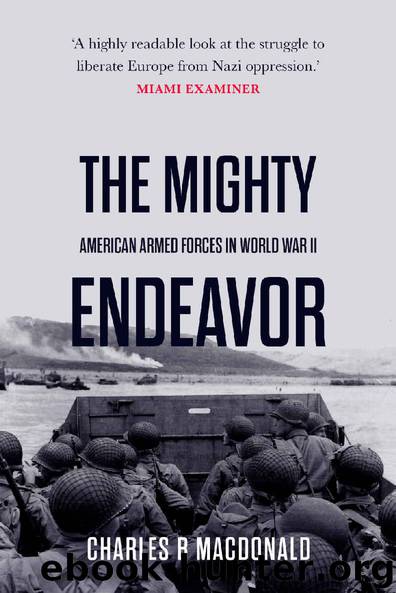The Mighty Endeavor: American Armed Forces in the European Theater in World War II by Charles B. MacDonald

Author:Charles B. MacDonald [MacDonald, Charles B.]
Language: eng
Format: epub, azw3
Publisher: Endeavour Media
Published: 2020-01-16T06:00:00+00:00
Chapter Seventeen – The Battle of the Hedgerows
The night of D Day, German troops plucked from a boat that drifted ashore a copy of the field order for the invasion issued by headquarters of the VII Corps, which controlled operations at UTAH Beach. The next evening other German soldiers found on the body of a fallen American officer a copy of the field order of the V Corps, whose troops had landed at OMAHA.[115]
Since the Germans by that time knew the location of the American landings, it came as no great revelation that the immediate American goals were St. Lô, provincial capital and road hub, and the port of Cherbourg. The orders gave no indication that General Bradley’s further goal was to drive to the base of the Cotentin peninsula and then turn the corner into Brittany to gain additional ports. Also they provided no inkling of British intentions. Since the British near Caen stood on the threshold of open country leading to Paris, Rundstedt and Rommel — the latter had returned to his headquarters at La Roche-Guyon — deemed they had no choice in any case but to continue to build greater strength against the British at Caen.
The Germans might have deduced from the purloined field orders that the American commitment in the Cotentin was so large as to preclude a second landing in the Pas de Calais. The Seventh Army commander, General Dollmann, drew that conclusion. Rundstedt, at least, was inclined to agree — but not OKW and Hitler. Since the Germans had estimated before D Day that the Allies had ninety-three divisions in Britain (they actually had thirty-nine), and since “Army Group Patton” had yet to make an appearance, they saw plenty of latitude for a second and larger invasion. Hitler insisted that Rundstedt hold back the bulk of the panzer reserve, and that the divisions of the Fifteenth Army in the Pas de Calais remain inviolate.
Rundstedt had trouble bringing even those forces immediately available to him to act decisively against the invasion. Since the attack of the 21st Panzer Division had bogged down on D Day, he intended to counterattack the British the next day with the two panzer divisions whose early commitment Hitler’s indecision had denied. Yet as Rommel had predicted before the invasion, Allied fighter-bombers proved merciless. Such delays and such heavy losses did the planes inflict that Rundstedt postponed the counterattack until June 8, and even then the tank regiment of one of the divisions failed to arrive in time.
While awaiting this regiment, Rundstedt decided to bring in the special headquarters he earlier had created for controlling the armored reserve, Panzer Group West; but by the time this Staff and its commander could arrive, others on the scene had felt impelled to use both panzer divisions to fill great gaps in the line. The counterattack died in the process.
Here early in the fighting the Germans displayed a malaise that was to become a permanent affliction. Delayed and disheartened by losses from incessant air
Download
The Mighty Endeavor: American Armed Forces in the European Theater in World War II by Charles B. MacDonald.azw3
This site does not store any files on its server. We only index and link to content provided by other sites. Please contact the content providers to delete copyright contents if any and email us, we'll remove relevant links or contents immediately.
| Africa | Americas |
| Arctic & Antarctica | Asia |
| Australia & Oceania | Europe |
| Middle East | Russia |
| United States | World |
| Ancient Civilizations | Military |
| Historical Study & Educational Resources |
Flight by Elephant(1484)
The Rise and Fall of the Third Reich: A History of Nazi Germany by William L. Shirer(1384)
Unbroken: A World War II Story of Survival, Resilience, and Redemption by Hillenbrand Laura(1103)
German submarine U-1105 'Black Panther' by Aaron Stephan Hamilton(1018)
Last Hope Island by Lynne Olson(937)
A Bridge Too Far by Cornelius Ryan(929)
The Victors - Eisenhower and His Boys The Men of World War II by Stephen E. Ambrose(904)
War by Unknown(904)
The Guns at Last Light: The War in Western Europe, 1944-1945 by Rick Atkinson(888)
Rogue Heroes: The History of the SAS, Britain's Secret Special Forces Unit That Sabotaged the Nazis and Changed the Nature of War by Ben Macintyre(884)
0060740124.(F4) by Robert W. Walker(873)
The Hitler Options: Alternate Decisions of World War II by Kenneth Macksey(866)
The Railway Man by Eric Lomax(847)
All the Gallant Men by Donald Stratton(815)
Hitler's Vikings by Jonathan Trigg(809)
A Tragedy of Democracy by Greg Robinson(802)
Churchill's Secret War by Madhusree Mukerjee(799)
Hitler's Armies by Chris McNab(782)
We Die Alone: A WWII Epic of Escape and Endurance by David Howarth & Stephen E. Ambrose(747)
